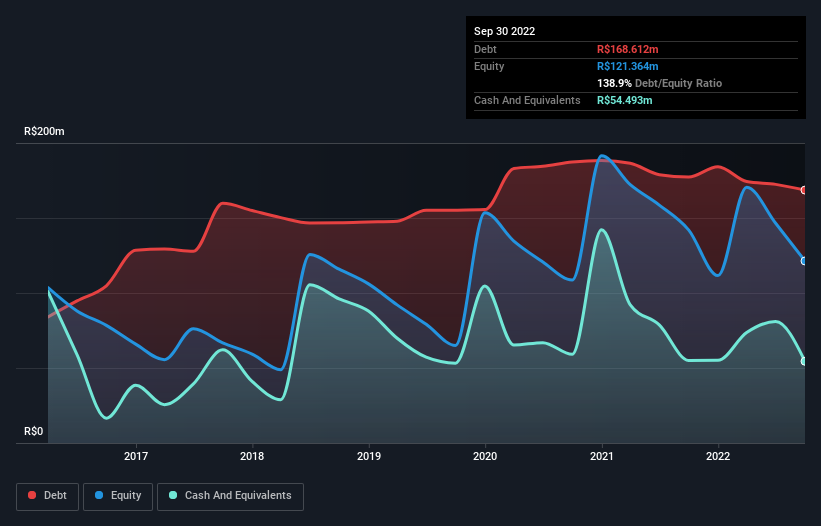The external fund manager backed by Berkshire Hathaway's Charlie Munger, Li Lu, makes no bones about it when he says 'The biggest investment risk is not the volatility of prices, but whether you will suffer a permanent loss of capital.' When we think about how risky a company is, we always like to look at its use of debt, since debt overload can lead to ruin. As with many other companies Biomm S.A. (BVMF:BIOM3) makes use of debt. But should shareholders be worried about its use of debt?
Why Does Debt Bring Risk?
Generally speaking, debt only becomes a real problem when a company can't easily pay it off, either by raising capital or with its own cash flow. If things get really bad, the lenders can take control of the business. However, a more usual (but still expensive) situation is where a company must dilute shareholders at a cheap share price simply to get debt under control. Having said that, the most common situation is where a company manages its debt reasonably well - and to its own advantage. The first thing to do when considering how much debt a business uses is to look at its cash and debt together.
See our latest analysis for Biomm
How Much Debt Does Biomm Carry?
You can click the graphic below for the historical numbers, but it shows that Biomm had R$168.6m of debt in September 2022, down from R$177.3m, one year before. However, it does have R$54.5m in cash offsetting this, leading to net debt of about R$114.1m.

How Healthy Is Biomm's Balance Sheet?
We can see from the most recent balance sheet that Biomm had liabilities of R$79.9m falling due within a year, and liabilities of R$151.4m due beyond that. Offsetting these obligations, it had cash of R$54.5m as well as receivables valued at R$30.5m due within 12 months. So its liabilities outweigh the sum of its cash and (near-term) receivables by R$146.3m.
This deficit isn't so bad because Biomm is worth R$378.0m, and thus could probably raise enough capital to shore up its balance sheet, if the need arose. But it's clear that we should definitely closely examine whether it can manage its debt without dilution. There's no doubt that we learn most about debt from the balance sheet. But it is Biomm's earnings that will influence how the balance sheet holds up in the future. So when considering debt, it's definitely worth looking at the earnings trend. Click here for an interactive snapshot.
Over 12 months, Biomm made a loss at the EBIT level, and saw its revenue drop to R$101m, which is a fall of 2.5%. That's not what we would hope to see.
Caveat Emptor
Over the last twelve months Biomm produced an earnings before interest and tax (EBIT) loss. Indeed, it lost a very considerable R$91m at the EBIT level. Considering that alongside the liabilities mentioned above does not give us much confidence that company should be using so much debt. So we think its balance sheet is a little strained, though not beyond repair. Another cause for caution is that is bled R$74m in negative free cash flow over the last twelve months. So in short it's a really risky stock. When analysing debt levels, the balance sheet is the obvious place to start. However, not all investment risk resides within the balance sheet - far from it. For instance, we've identified 5 warning signs for Biomm (2 are a bit concerning) you should be aware of.
At the end of the day, it's often better to focus on companies that are free from net debt. You can access our special list of such companies (all with a track record of profit growth). It's free.
Valuation is complex, but we're here to simplify it.
Discover if Biomm might be undervalued or overvalued with our detailed analysis, featuring fair value estimates, potential risks, dividends, insider trades, and its financial condition.
Access Free AnalysisHave feedback on this article? Concerned about the content? Get in touch with us directly. Alternatively, email editorial-team (at) simplywallst.com.
This article by Simply Wall St is general in nature. We provide commentary based on historical data and analyst forecasts only using an unbiased methodology and our articles are not intended to be financial advice. It does not constitute a recommendation to buy or sell any stock, and does not take account of your objectives, or your financial situation. We aim to bring you long-term focused analysis driven by fundamental data. Note that our analysis may not factor in the latest price-sensitive company announcements or qualitative material. Simply Wall St has no position in any stocks mentioned.
About BOVESPA:BIOM3
Adequate balance sheet with low risk.
Market Insights
Community Narratives



